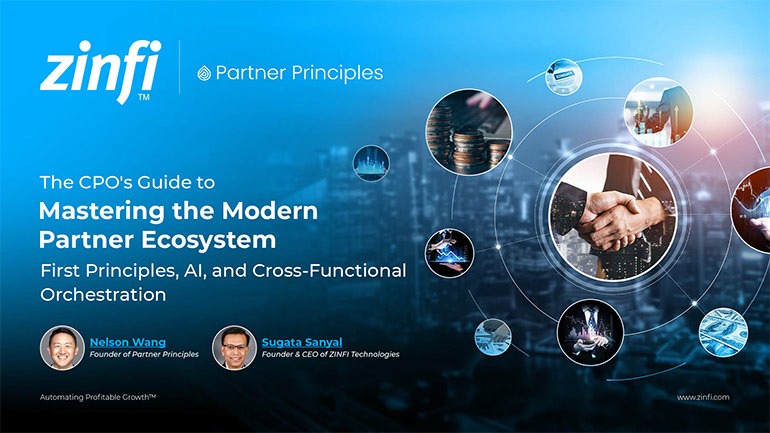Effective Channel Management requires vendors to maintain long-term strategic thinking—often spanning multiple quarters or years—while executing plans on a short-term, typically quarterly basis. This dual focus ensures immediate revenue generation while systematically building a durable, high-performing partner ecosystem aligned with the vendor’s goals.
Best Practices Articles

Channel Management: Why Thinking Long-Term and Acting Short-Term Matters
Channel Management is the strategic imperative of balancing multi-year, long-term ecosystem development with process-based, short-term execution via third-party partners. It is critical for maximizing Return on Investment by actively shifting focus away from purely transactional behaviors toward data-driven insights into partner productivity. Higher channel performance requires longer-term strategic thinking executed on a structured, quarterly basis.
- Who is this for?: Partner Managers, PartnerOps Managers, Chief Revenue Officers (CROs), RevOps professionals, and sales executives in Technology, Manufacturing, and Automotive sectors.
- Core Problem Solved: Overcoming the limitations of short-term, transactional channel activities to gain data-driven insights into why the most productive partners are successful, thereby enabling channel rationalization.
- Key Tech/Entities: Partner Relationship Management (PRM) platforms, Marketing Development Funds (MDF) automation, and SCORM-compliant partner enablement and training modules.
Jack Welch is famous for saying, “You can’t grow long-term if you can’t eat short-term. Anybody can manage short. Anybody can manage long. Balancing those two things is what management is.” This is what I call walking and chewing gum. I know it may sound like a cliché, but nothing is more important in channel management than this fundamental principle of balancing long-term and short-term objectives. Let’s discuss why this is the case.
I’ve written before about the multiple challenges of channel management. Let me focus on a few that are particularly relevant to today’s topic:- Most channel are managed (number wise) on a quarterly basis
- Most channel activities are quarterly-focused
- Most marketing and sales activities require a process-based, longer-term approach
- Channel partners do not report to a vendor—they are their own boss
- Reorganization in most large companies changes channel directions quite frequently
- Lack of automation and access to data provide very little insight into causes and effects related to programs
- A majority of vendors rely on a small portion of partners driving most of their revenue while continuing to support a very broad channel
I could keep adding to this list, but these seven are sufficient to make my point. With all of these challenges, there are basically two forces at play: activities with short-term goals, but also activities that have longer-term impact. Channel management happens on a quarterly basis, so that’s certainly short-term, but most sales and marketing activities need to be managed with a longer-term focus. Partners do not report to vendors, so they don’t necessarily respond to ad hoc programs. Most companies that sell through the channel lack insight into who the productive partners are and why. They may have a partial answer to this question—i.e., who sells the most—but they rarely know much about why those partners are more successful.
The reality is very little can be done in a channel with a short-term focus, yet the majority of our activities tend to be driven on a 90-day cycle. Allow me to make a very strong statement after working with hundreds of major companies driving sales through channels of all kinds (technology, manufacturing, finance, retail, automotive, etc.): The only way a channel can be managed to higher levels of performance is to engage in longer-term strategic thinking that is executed on a quarterly basis.
What I am saying, essentially, is that companies need to figure out how to rationalizetheir channels. In other words, they need to be able to answer the following questions:
- Which partners sell the most and why?
- What do we need to do to make less productive partners more productive?
- How do we make the next group of partners align their business objectives with ours, and incentivize and enable them to sell more of our solutions?
- What programs are most effective when it comes to various aspects of channel management— e.g., recruitment, engagement, enablement and management?
- How do we align our internal infrastructure better to provide real-time dynamic feedback to our execution?
Every one of these questions is critical, and each requires a deep level of thinking that can happen only from a longer-term perspective. To answer these questions and take actions based on meaningful insights requires a multi-quarter approach, and in many cases it takes a multi-year approach.
Unfortunately, constant re-organizations within vendor firms and changes among channel organizations have a tendency to keep most vendors’ focus on the short term. This leads to behaviors that are highly transactional: offering more discounts, random partner recruitment, sporadic training, inconsistent demand generation activities, and so on. But the best way to do more with less and get a higher return is to take what Jack Welch said to heart. Make sure you are surviving in the short term, but don’t neglect to think long-term to drive your products, processes and people to increasingly higher levels of execution.
To know more about Channel Management, please read the article - The Ultimate Guide to Channel Management.
Frequently Asked Questions
Channel Management success is undermined by an excessive focus on the 90-day cycle, which drives transactional behaviors such as random partner recruitment and sporadic training. Additional challenges include frequent internal reorganizations, shifting channel strategies, and a critical lack of data-driven insight into partner productivity.
Rationalizing the channel involves strategically analyzing the partner ecosystem to identify which partners sell the most, understand the reasons behind their success, and determine actions needed to improve the productivity of underperforming partners. This process ensures that resources, programs, and incentives are aligned with core business objectives.
Automation plays a critical role by enabling access to real-time, dynamic data, which provides insight into the causes and effects of specific channel programs. Without automation, vendors lack the necessary feedback loop; with it, organizations achieve stronger infrastructure alignment, improved execution, and higher overall channel performance.
Best Practices Guides
 First Principles Drive Modern Partner Ecosystem Success Best Practices
First Principles Drive Modern Partner Ecosystem Success Best PracticesDownload for FREE
 The Future of Managed Service Providers: Navigating the Age of AI and Automation
The Future of Managed Service Providers: Navigating the Age of AI and AutomationDownload for FREE
 Modernizing Channel Marketing: AI and Ecosystem Enablement Best Practices
Modernizing Channel Marketing: AI and Ecosystem Enablement Best PracticesDownload for FREE
 The Channel’s Shift to Partner-Led With AI Best Practices
The Channel’s Shift to Partner-Led With AI Best PracticesDownload for FREE
 Hyperscalers, ISVs, and AI: Shaping the Future of B2B Software Distribution
Hyperscalers, ISVs, and AI: Shaping the Future of B2B Software DistributionDownload for FREE
 Definitive Guide to a Partner Ecosystem-First Sales Strategy
Definitive Guide to a Partner Ecosystem-First Sales StrategyDownload for FREE
 The Partner-Led Digital and AI Transformation Best Practices
The Partner-Led Digital and AI Transformation Best PracticesDownload for FREE
 Startup Talent Recruitment: Hiring Missionaries, Not Mercenaries
Startup Talent Recruitment: Hiring Missionaries, Not MercenariesDownload for FREE
 The Future of Partner Relationship Management with AI in Partnerships
The Future of Partner Relationship Management with AI in PartnershipsDownload for FREE
 Cybersecurity for the 99%: Strategies from the Frontline
Cybersecurity for the 99%: Strategies from the FrontlineDownload for FREE
 Mastering Partner Relationships: A Strategic Approach to Business Growth
Mastering Partner Relationships: A Strategic Approach to Business GrowthDownload for FREE
 Mastering Partner Relationship Management: Keys to SaaS Channel Success
Mastering Partner Relationship Management: Keys to SaaS Channel SuccessDownload for FREE